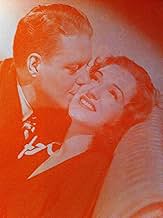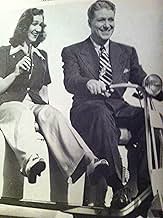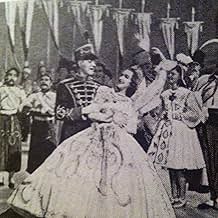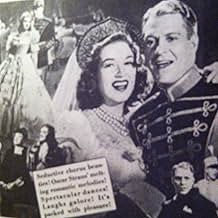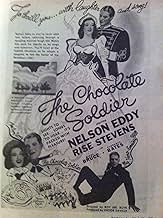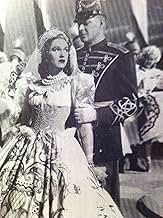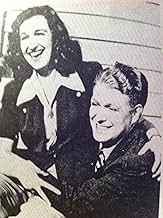Aggiungi una trama nella tua linguaMaria and Karl Lang are the singing duo of Vienna. Maria is very flirtatious and Karl very jealous. Karl decides to masquerade as a Russian guardsman and attempts to make Maria flirt with hi... Leggi tuttoMaria and Karl Lang are the singing duo of Vienna. Maria is very flirtatious and Karl very jealous. Karl decides to masquerade as a Russian guardsman and attempts to make Maria flirt with him - to test her loyalty to him. As the Russian, Karl makes a vigorous attempt to seduce Ma... Leggi tuttoMaria and Karl Lang are the singing duo of Vienna. Maria is very flirtatious and Karl very jealous. Karl decides to masquerade as a Russian guardsman and attempts to make Maria flirt with him - to test her loyalty to him. As the Russian, Karl makes a vigorous attempt to seduce Maria. For a moment she accepts then rejects him. Karl is left in turmoil.
- Regia
- Sceneggiatura
- Star
- Candidato a 3 Oscar
- 3 vittorie e 3 candidature totali
- Magda
- (as Dorothy Gilmore)
- Undetermined Secondary Role
- (non citato nei titoli originali)
- Singer - 'Seek the Spy' Sequence
- (non citato nei titoli originali)
- Emile, Voice Coach
- (non citato nei titoli originali)
- Waiter at the Double Eagle
- (non citato nei titoli originali)
- Messenger with Note
- (non citato nei titoli originali)
- Solo Bit in 'Thank the Lord the War is Over' Number
- (non citato nei titoli originali)
- Performer in Gypsy Café Sequence
- (non citato nei titoli originali)
- Solo Bit in 'Thank the Lord the War is Over' Number
- (non citato nei titoli originali)
- Stage Manager
- (non citato nei titoli originali)
- Flute Player
- (non citato nei titoli originali)
Recensioni in evidenza
I will agree that the story about a man suspecting his wife of infidelity is predictable and creaks with age, and the choreography at times was disappointingly unexciting and pedestrian. But putting these flaws aside, this is a truly beautiful and entertaining film. One thing for certain, the production values were simply fabulous. The lavish costumes and beautiful sets were really a wonder to look at. The score is phenomenal, featuring some Oscar Strauss hits like My Hero, Thank the Lord the War is Over, Sympathy and of course the Chocolate Soldier, and some well known opera gems like Mon Couer s'oeuvre a Ta voix from Saint Saens's Samson and Delilah and Evening Star from Wagner's Tannhauser. While my Lady Sleeps was stunning too, but the real highlight was the enormously entertaining Song of the Flea. The performances were sublime; while the beautiful Rise Stevens is probably at her loveliest and sings beautifully, it is the wonderful undervalued Nelson Eddy who steals the show with his beautiful resonant voice and flawless comic timing and stage presence. Nigel Bruce and Florence Bates are good too.
All in all, a beautiful film. Not perfect, but the production values, score and performances make it a treat. 8/10 Bethany Cox
Both singers are in fine voice but it's Eddy who steals the show with his rendition of "Song of the Flea". Nelson Eddy was rarely praised for his acting prowess, but here he delivers a solid, sensational performance with great flair and dexterity. Absolutely his best work as an actor!
The pleasant supporting cast includes Nigel Bruce and Florence Bates.
Lo sapevi?
- QuizThis has interesting origins from musical and non-musical plays. In 1909, the operetta "The Chocolate Soldier" opened in New York. This was based on the non-musical play "Arms and the Man" by George Bernard Shaw. However, Shaw voiced objections to his play being adapted as an operetta. A silent film adaptation, The Chocolate Soldier (1914), based on the New York operetta, omitted any reference to George Bernard Shaw. In 1911, a Hungarian non-musical play "Testör" ("The Guardsman") by Ferenc Molnár, opened in Budapest. In 1941 when this film was made, George Bernard Shaw was still alive. Therefore, the music of the New York operetta and the plot of the Hungarian non-musical play "The Guardsman" were used.
- BlooperWhen Eddy is impersonating a Russian singer, the nightclub impresario introduces him as a bass, but then Eddy sings. He is a baritone.
- ConnessioniFeatured in We Must Have Music (1941)
- Colonne sonoreMy Hero
(1909) (uncredited)
Music by Oscar Straus
Musical adaptation by Bronislau Kaper and Herbert Stothart (1941)
Original lyrics by Rudolph Bernauer and Leopold Jacobson
English lyrics by Hugh Stanislaus Stange (as Stanislaus Stange)
Additional lyrics by Gus Kahn (1941)
Sung by Risë Stevens and Nelson Eddy in the show
Hummed a cappella by Florence Bates
Sung by Risë Stevens in the Gypsy Café
Reprised by Risë Stevens and Nelson Eddy in the show at the end
I più visti
Dettagli
- Tempo di esecuzione1 ora 42 minuti
- Colore
- Proporzioni
- 1.37 : 1
Contribuisci a questa pagina


